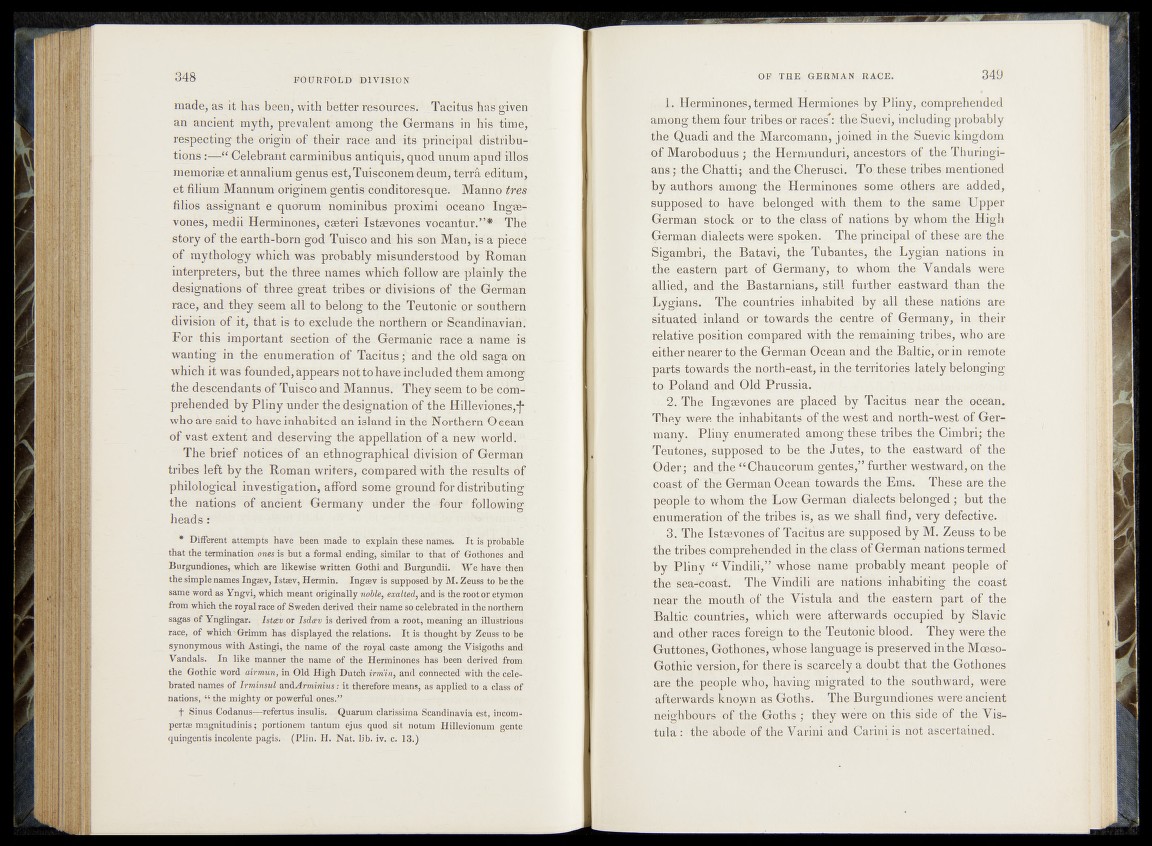
made, as it has been, with better resources.*' Tacituë ha’s'given
an ancient myth, prevalent* among the Germans* *in '‘tóÉfiimë,
respecting the origin of their race: and. it4 prihfcipal distribué
tions ;—L^‘Celebrant carminibus antiquis, quod uniim apudHllos
memorise et annaliuffi genus est,Tuisêonem deum, tèïfâ editum,
et filium Mannum originem gentis conditoreàquev Manno tres
fi Uö$ assignant e quorum nominibus proxi mi ocean’o Iûgæ-
vonès, medii Herminones, cæteri Istævonèsvocantur. ’ ’ * The
story of the earth-born god Tuiscö and his sb’hr Man, is a pièce
of mythology which was probahljr misunderstood by Roman
interpreters, but the three names which follow are pMhily the
designations of three great tribes or divisions of the German
race, and they seem all- to belong to the TeufenicW sfithfaern
division o f it, that is to exclùde the northemorStbudib^tiam
För this important section of th e ,GermanicJra c e a nàtife'i^
wanting in the enumeration of Tacitus ;v dnd tlié bld Sag^ on
which it was founded, appears not tohave included t-Hèrii(sàiloM§i
the descendants of Tuisco and Mannus. They sefetirtb'b’ë’côm-
prehehded by Pliny under the designationfof the Hille\4mes,f
whoare said to have inhabited ah island inth e NortherüG éëâ'iî
of ïvast e x t^ t and dèservîhg tlm'âppellation: of a neiv-worlds
The brief notices of an ethnographiedl-divtslöft of Gérmarf
tribes left by the Roman writers, compared with tile ,results of
philological investigation, afford some ground for distributing!
the nations of ancient Germany under thé »four follbWifi^
heads :
* Different attempts have been made to explain these names.. I t is'probable
that the termination ones is bat a formal ending, similar to that of Gothönés’ and
Burgundiones, which are likewise written Gothi and Burgundii. We have‘then
the simple names Ingæv, Istæv, Hermin. Ingæv is supposed by M. Zeuss te be the
same word as Yngvi, which meant originally noble, exa lted , and is the root or etymon
from which the royal race of Sweden derived their name so celebrated in the northern
sagas of Ynglingar. is tæ v or Isdoe v is derived from a root, meaning an illustrious
race, of which 'Grimm has. displayed the relations. It is thought by Zeuss to be
synonymous with Astingi, the name of the royal caste among the Visigoths and
Vandals. In like manner the name of the Heiminones has been derived from
die Gothic word a irm a n , in Old High Dutch ivm in , and connected with the celebrated
names of I rm in s u l a n à A rm in iu s : i t therefore means, as applied to a class of
nations, “/the mighty or powerful önes/ijE
t Sinus Codanus—refertus insulis; Quarum clarissima Scandinavia est, inçom-
pertæ magnitudinis; portionem tantum ejus quod sit notum Hillevionum gente
quingentis incolente pagis.■■ (Plio. H. Nat. lib. iv. c. 13.)
1 . Ilerminonos, termed Hermiones by. Pliny, comprehended
arppngf hem, four tribes or .races.: ,the Suevi, including probably
the Quadi and the Marcomann, joined inthe Suevic kingdom
qf. Maroboduus.j. the Hermunduri, ancestors of the Thuringi-
ans j-the Ghatti;.fand.the Cherusci. To thgse;tribes mentioned
by authors among.,the Herminones some others are added,
supposed, tp^haygv belonged/,yyath them to the same Upper
,German sstock•„or to the clf.ss.of nations.by,whom the High
Geripan^dialgCt^ were, spoken. The principal! of these are the
Sig^mibri, the Batavi, dhe -Tubanfes^.the .Lygian nations in
the eas^erii part of Germ^nyiylo whom the "Vandals were
allied, and the R a sta rn ian j^ till further eastward than the
Jj.ygians. The, countries- .inhabited by all these natidns are
situated inland or towards the centre of Germany, .in their
relatiyqpo&iticm compared with the rpmainingitribes, w.ho are
eitheripea^er to the German,Ocean .agff ,the Baltic, or,in remote
parts ..towards the north-east, in the territories lately belonging
tötlBöland andtlG S Prussia.- •,
2t,fThe Ingaeyones are placed by Tacitus near the ocean.
They, were inhabitants qf.the west and north-we^t of Germany.
^Pliny ^numerated among tb^§e ^ibe^tjae Cimbri^ the
supposed to/Jbb the JuteS^to the eastward of the
Oder; andjtheXi C h a u c o r . u ’ further westward, on the
coast of the German Oceap.towards fhej Ems.. These are the
pepple; ta whom the Low.German dialects belonged; 'but the
enumeration of the trihdsrife'l as we shall find, very defective.
• 3. The Istaevones of Tacitus are-supposed by M. Zeuss to be
the trikes comprehended in the’.clafs^iq^ German nations termed
by Pliny “ Vindili,” ^hösé^riaröe^ vpröbably meant people of
the 'se&Jcoast. The Vindili are natiëris- inhabiting the coast
nëar the mouth of the Yrstula and the ^eastern part of the
Baltic countries, which were afterwards .occupied by Slavic
and other races foreign to the Teutonic blood. They were the
Guttones, Góthoriës, whose language is preserved in the Moeso-
Gothic Version, for there is‘scarcely a doubt that tHe Gothones
are the kpe§pï&,swJio, havin ^ migrated to .the,.southward, were
afterwards known as ,GothsUui The Burgundiones were ancient
neighbour's 'of thé Gbth# • they were'off thi§fside of the Vistula
: 'tiie abède of the Var’ini and Caripiis not ascertained.